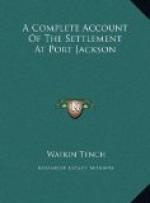Of the two ships of war, the ‘Sirius’ and ‘Supply’, the latter was incessantly employed in transporting troops, convicts, and stores, to Norfolk Island; and the ‘Sirius’ in preparing for a voyage to some port, where provisions for our use might be purchased, the expected supply from England not having arrived. It is but justice to the officers and men of both these ships to add, that, on all occasions, they fully shared every hardship and fatigue with those on shore.
On the convicts the burden fell yet heavier: necessity compelled us to allot to them the most slavish and laborious employments. Those operations, which in other countries are performed by the brute creation, were here effected by the exertions of men: but this ought not to be considered a grievance; because they had always been taught to expect it, as the inevitable consequence of their offences against society. Severity was rarely exercised on them; and justice was administered without partiality or discrimination. Their ration of provisions, except in being debarred from an allowance of spirits, was equal to that which the marines received. Under these circumstances I record with pleasure, that they behaved better than had been predicted of them—to have expected sudden and complete reformation of conduct, were romantic and chimerical.
Our cultivation of the land was yet in its infancy. We had hitherto tried only the country contiguous to Sydney. Here the governor had established a government-farm; at the head of which a competent person of his own household was placed, with convicts to work under him. Almost the whole of the officers likewise accepted of small tracts of ground, for the purpose of raising grain and vegetables: but experience proved to us, that the soil would produce neither without manure; and as this was not to be procured, our vigour soon slackened; and most of the farms (among which was the one belonging to government) were successively abandoned.
With the natives we were very little more acquainted than on our arrival in the country. Our intercourse with them was neither frequent or cordial. They seemed studiously to avoid us, either from fear, jealousy, or hatred. When they met with unarmed stragglers, they sometimes killed, and sometimes wounded them. I confess that, in common with many others, I was inclined to attribute this conduct, to a spirit of malignant levity. But a farther acquaintance with them, founded on several instances of their humanity and generosity, which shall be noticed in their proper places, has entirely reversed my opinion; and led me to conclude, that the unprovoked outrages committed upon them, by unprincipled individuals among us, caused the evils we had experienced. To prevent them from being plundered of their fishing-tackle and weapons of war, a proclamation was issued, forbidding their sale among us; but it was not attended with the good effect which was hoped for from it.




